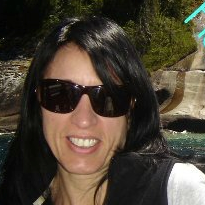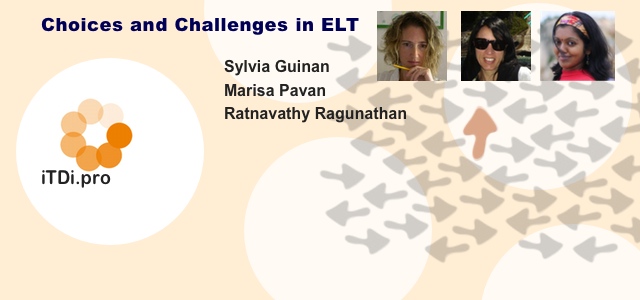
Choices, Motherhood and Becoming Myself
Sylvia Guinan
This is my story of motherhood and becoming an online teacher, professional development organizer, blogger and writer. Chuck Sandy asked me to tell my story after my iTDiMOOC Presentation where I shared ideas about creative thinking for teachers.

As always in the flow of a presentation, we often share things spontaneously, from the heart, things that are not ‘scripted’. I’ve never really told this story, though I’ve referred to it many times. In my iTDi presentation, participants were curious about how I manage my work and four children.
My simple answer was that it’s because of my children that I teach and write online. This was my answer to trying to do it all. It seemed to be the best way to be a stay-at-home mother while earning a living at the same time. Soon it came to mean much more than earning a living. I fell in love with the nature of the work. How does working online appeal to mothers or myself in particular?
Apart from being able to stay at home, I was captivated by the freedom to create. As online teaching was still in its infancy, my very decision to go in that direction back in 2009, put me at the forefront of cutting-edge trends in education. I threw myself into the challenge of educational technology, networking and the many blessings of writing and blogging. I was definitely ‘becoming more myself’, as for the first time I was allowing myself to write and create, instead of just ‘doing what Had to be done’.
Chuck asked me to dig deeper into my story, so I’m going back in time to how it really was and how things really happened. When my first child was three, my twins were born. That was a very challenging, yet miraculous time. It was also a time that taught me a lot of my own strength, inner resources, and the power of belief and optimism.
My twins were born two months premature and had to spend two months in incubators. It was very scary as they were tiny, but I just developed a faith that they would be okay and I developed my own personal plan of action and mindset to ‘make sure’ that they would be okay.
The plan of action made me feel empowered even though the lives of my babies were, ‘practically speaking’ in the hands of the doctors. The sense of empowerment, however, helped me to remain positive throughout those two months.
I promised myself that I would breastfeed the twins, even thought they were being fed intravaneously from birth. When I told the doctors and nurses in intensive care they told me that it was impossible and they’d never seen a woman keeping her breast milk for two month – the time it would take for them to grow. However, I knew that it was possible and I rented a massive pumping machine. I had to pump out my milk every two hours, 24 hours a day, in order to remain healthy and not get mastitis or any kind of infection, and not to lose my milk supply
I made little toy pumps for my toddler Elisabeth and we would play with her dolls. She’d pretend to pump out milk for her babies too. We also spent a lot of time reading stories together while I was pumping so that she would still get enough attention during this tough time. I didn’t care about anything except keeping my breast milk flow, minding my toddler and visiting the twins every day. My whole existence revolved around that.
The day came when my tiny daughter had her first taste of breast milk weighing 2.2 kilos. The doctors had said that she’d have no sucking reflex, but she took to it immediately and about six nurses came to watch the miraculous event. Soon my son was able to breast feed too. I continued to breastfeed both of them for sixteen months.
This experience made me feel so proud to be a mother that it became a pivotal moment in my life where I told myself I could do anything if I put my mind to it. Back home, I was practically alone in raising the twins. We had no family nearby but I had one best friend who was more like a sister. I had, of course, given up teaching in this time, though I had a scary moment one day when I thought that I might never be able to work again – at least for another six years. I was sitting on the floor practically swimming in nappies when my recent copy of the ELT News caught my eye. An advert about online teaching jumped out at me – and my new dream was born.
When the twins were a year old and I was still breastfeeding, I got pregnant again – the ‘impossible’ had happened. However, my Irish background and growing up with seven siblings had me well-adjusted to the notion of large families – though this was really sudden and unexpected. Of course, it’s also easier to raise large families in Ireland as there is wonderful state support, whereas in Greece there was less support and no extended family.
I spent those two years minding my three babies and toddler by day, and studying everything I could about online teaching at night. I learnt about virtual classrooms, educational technology and creating courses.
In those days I spent most of my time learning from Nik Peachey’s blog, so in that sense he was my first online mentor. I was amazed by how much he was sharing for free on his blog and I promised myself that some day I’d find a way to repay the inspiration. When I joined facebook I found him and offered to blog about his work and interview him. When he saw my article and story he really surprised that his work had had such a big impact on a reader of his blog. The lesson here is that firstly, we never really know who we are reaching or whose lives we are changing when we share online. The other lesson is that no matter how much we may put ‘gurus’ on pedestals, they are usually much more modest than we’d ever expect.
See the interviews and stories here.
My first online influence featuring Nik Peachey
Top ten things teachers want from their digital classrooms
In 2014, I had another chance to repay the inspiration when Nik started his digital classrooms project. I was able to help him raise funds through my networks and blogs and I’m also one of his official reviewers for the book he’s writing.

Studying, experimenting and blogging were the easy parts of my plan. The hard parts were actually having lessons without my kids interrupting. I did a minimum of hours, biding time till they all got a bit bigger. I still have class recordings with baby voices in the background and still get interrupted on occasion, and I can be seen running from my desk to answer cries – even in my recent spring blog festival webinars.

Something important I did in the early days was the weekly Edupunk class in collaboration with George Machlan at WiziQ. This was the beginning of my foray into creative alternatives to ‘standard’ ELT teaching methodologies, and everything I do today is based on those early experiments.
There were hard times when I was the only one who believed in what I was doing – but believe in it I did, and I had my ever-growing personal learning network online to support me and keep the inspiration alive.
Who have I become and who are my children becoming?
I’ve become someone who answers the call of inspiration.
I’ve become someone who can feel hope even in the darkest hours.
I’ve become someone who does what she loves.
Before working online my childhood dream of writing had never been fulfilled, even though I studied English literature at university. In fact, I was so in awe of the writers I studied that I told myself that I would never be able to do it. That pessimist is gone for good.

My children are becoming very creative and independent.
They write books, make comics, and create amazing works of art. They were invited to read their books at a local book exhibition last year.
They also create their own multi-media comics, posters etc – and have done so from a very young age.
Having my kids almost all the same age created an amazing situation where they all learn from each other and where Vygotsky’s zone of proximal development and collaborative learning naturally evolved. Although there may be sibling rivalry at times – especially between the twins and youngest, what they do for each other is amazing.
Lessons learnt
Instead of over-supervising kids, the best thing is to provide special learning spaces and play areas and equip them with the ingredients for creative play.
This means lots of paper, crayons, and books. These are my staples. We didn’t need much money to give our kids the great gift of all. We didn’t need too many fancy toys. In fact, many fancy toys kill creativity.
What they really need is example; seeing your read, write, and create.
Then, they need excitement and encouragement. Each new thing they create thrills me and they know it.
Parenthood can teach us a lot about teaching and vice versa.
Children can teach us so much about creativity.
That’s why I say they are my inspiration and that everything I have become today is through them.
This is not a story about perfection – as we are far from perfect. It’s just a story about imperfection mixed with optimism. It’s also a story about essence. With children we can say that less is more.
Less materialism and more quality.
Less over- vigilance and more trust.
Less control and more creativity.
Lastly, to the mothers and teachers who wonder how I do this. I didn’t do it all at the same time – it did what I could when I could over a six year period – and before that just by reading and researching. Now my kids are all school age, so I work when they are in school.
I also have colleague from Malaysia called Anita Adnan who has eight kids and a PhD. We should ask her how she does it;)
Connect with authors, iTDi Associates, Mentors, and Faculty by joining iTDi Community. Sign Up For A Free iTDi Account to create your profile and get immediate access to our social forums and trial lessons from our English For Teachers and Teacher Development courses.







